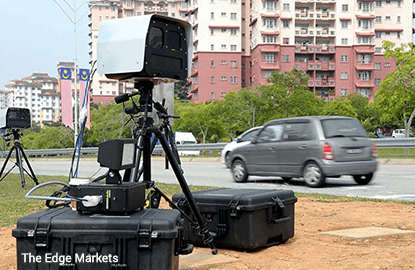
AS risk-takers know, not all bets pay off. Sixteen months after buying half of the ownership of the controversial automated traffic enforcement system (AES) operations in Malaysia, Boustead Holdings Bhd is still waiting for the green light from the government to implement the second phase.
According to people familiar with the matter, the company has gone through several rounds of negotiations with the relevant ministries, including Transport and Finance, to finalise the terms and conditions of the AES concession agreement. It is understood that while AES has gained support among local officials as a proven method of reducing accidents and enforcing traffic laws, delays in its full implementation occur mainly due to bureaucratic bottlenecks.
AES is an electronic system that captures offences committed by motorists on camera along federal roads and highways.
The government had awarded a 66-month AES concession contract to ATES Sdn Bhd and Beta Tegap Sdn Bhd in December 2011. They began operating the system on Sept 23, 2012, with 14 cameras installed in Perak, Selangor, Putrajaya and Kuala Lumpur. However, the government had to take over the operations in 2013 following disputes over the legality of summonses issued by civilian companies and a political backlash over a lack of transparency in awarding the concession.
Under the AES scheme, the initial plan was to install 1,093 cameras nationwide.
In April last year, Boustead stepped in and paid RM199 million for a 50% stake in Irat Properties Sdn Bhd, which wholly owns ATES and Beta Tegap. Irat Properties also owns Chulan Tower and The Royale Chulan hotel in Jalan Conlay, Kuala Lumpur.
Boustead’s parent Lembaga Tabung Angkatan Tentera (LTAT) holds a 49.17% stake in Irat Properties while Irat Holdings Sdn Bhd owns the remaining 0.83%.
At the time, the full roll-out of AES was expected to provide another source of revenue for the Boustead Group and improve its earnings visibility in the longer term. Boustead was also optimistic that the operation would pick up where it left off with the backing of its 60.8% shareholder, LTAT.
“Boustead has invested a lot in this (to take over the concession holder of AES). Feasibility studies for AES were also done, which showed the effectiveness of the system. The group has also undertaken a right-sizing exercise of the operation,” a source tells The Edge.
However, another source says with the 14th general election coming up, the possibility of phase two of AES taking off anytime soon is slim.
When contacted, Boustead officials declined to comment.
In March, Deputy Transport Minister Datuk Ab Aziz Kaprawi was quoted as saying that the government was “hopeful” that the terms of the AES concession agreement would be finalised in May, to coincide with the implementation of the Automated Awareness Safety System, which is a combination of AES and the Demerit Points System.
“[The negotiations] involve other stakeholders such as the Ministry of Finance. It is not decided by one minister,” he reportedly said at the Parliament lobby when asked why negotiations were taking so long.
The extra revenue would come in handy for Boustead, which saw its 1HFY2016 revenue fall 4.2% year on year to RM3.93 billion due to lower contribution from the heavy industries division.
While net profit for the six months ended June 30, 2016, surged 68 times y-o-y to
RM204.3 million, it was mainly due to gains on disposal of its 30% stake in associate Jendela Hikmat Sdn Bhd as well as plantation land. Stripping out the one-off gains, the group incurred a core net loss of RM127.5 million.
“The AES operation was supposed to be rolled out [fully] in the first quarter of this year. It would have provided good cash flow for them (Boustead),” says a source. The government had reportedly forked out a contract service fee of RM60.12 million to ATES and Beta Tegap as at Aug 25 last year.
Recall that ATES holds a concession contract to undertake the AES operation in Perlis, Kedah, Penang, Perak, Kelantan, Sarawak, Sabah and Labuan, while Beta Tegap has exclusive rights to undertake it in Kuala Lumpur, Putrajaya, Selangor, Negeri Sembilan, Melaka, Johor, Pahang and Terengganu.
For the financial year ended June 30, 2014 (FY2014), ATES recorded a net loss of RM20.61 million and its consolidated net liabilities stood at RM47.12 million.
Beta Tegap was also in the red, posting a net loss of RM22.58 million with consolidated net liabilities of RM32.8 million in FY2014.
In a note to clients last Thursday, Kenanga Research analyst Raymond Choo Ping Khoon says he is forecasting Boustead to post a net loss of RM43 million in FY2016 following the weak first-half results and taking into account lower contributions from the plantations, trading and industrials divisions.
Correspondingly, Choo reduced his target price for the stock from RM1.87 to RM1.72 while maintaining an “underperform” rating. Year to date, Boustead’s share price has fallen 19% from RM2.79 on Dec 31, 2015. It closed at RM2.25 last Thursday, giving the company a market capitalisation of RM4.56 billion.
Save by subscribing to us for your print and/or digital copy.
P/S: The Edge is also available on Apple's AppStore and Androids' Google Play.